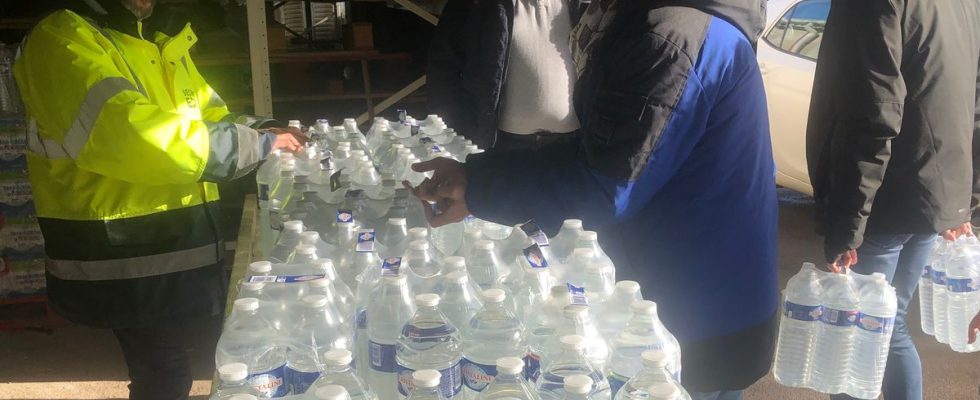Feet in water, throat dry. This is the mishap which still affects around 7,000 people around Samer, in Pas-de-Calais, after the episode of exceptional flooding. While the recession is well underway, some towns near Boulogne-sur-Mer are still deprived of drinking water. The municipality of Samer must organize a distribution of bottled water every day, with the help of the network manager, Veolia.
“Everyone is hard at work and great solidarity has been established in these difficult times,” explains Christophe Douchain, mayor of Samer. Because for almost a week, the vast majority of residents in the town and some surrounding villages no longer had water in the tap. Ironic when, at the same time, the sector was affected by historic floods.
Law of series
“It is precisely the rain and the runoff that have had an impact on the quality of the water,” says Régis Annebicque, territorial director of Veolia, water manager in Samer. The cause is suspended matter from clay soil which has appeared in large numbers at the supply borehole. “The turbidity level of the water had never been reached. It was multiplied by four compared to usual and we were unable to cope,” underlines Rudy Baillet, drinking water manager at Veolia. The result was water so cloudy that it was no longer even possible to convey it through the pipes. “We then tried to bring drinking water to the treatment plant via tanker trucks from the neighboring village of Carly, but the demand was too high compared to the supply and it was very quickly necessary to stop to secure the network,” continues Régis Annebicque.
After four days without running water, it finally returned on Monday, but still undrinkable. Except that the series law struck immediately, with a break in the town’s supply pipe. “With the movements on the ground, it didn’t hold,” laments Rudy Baillet. It was only on Wednesday, after repairs, that the population was able to see water gushing out of the tap again. “But it is water that remains unfit for consumption, so we continue to organize the distribution of bottled water,” explains the mayor of Samer, Christophe Douchain.
“We have never experienced this”
“Approximately 12,000 bottles are distributed per day,” says Caroline Meklemberg, deputy mayor, who was in charge of the operation this Friday. “We constantly have people coming,” she continues. But it’s especially at the end of the afternoon, after work, that there are a lot of people,” she adds. And the situation is likely to persist because Veolia, despite the mobilization of around sixty agents, is unable to give a date for a return to normal. “Even if it stops raining for several days, the drop in the level of particles in the water is not linear. This is a very particular phenomenon. We’ve never experienced that,” admits Rudy Baillet.
The instability of the land also concerns the Samer Water Union. “We are looking for technical means of prevention to best deal with possible future turbidity problems,” indicates its president, Luc Van Roekeghem. Especially since the neighboring villages of Doudeauville and Quesques have experienced the same pollution problems. “As soon as we have regained a normal level of drinking, we will notify the Regional Health Agency which must give its approval to authorize consumption,” adds Rudy Baillet.
Samer has just been recognized as being in a state of natural disaster after the floods which only affected part of the town. “Two months ago,” laments the mayor, “we had already been recognized as being in a state of natural disaster, but this time, because of the drought. »

